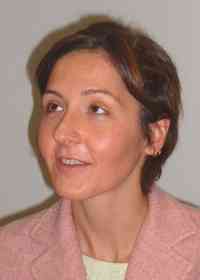 I was born in what today we call Lebanon. It's true that I am living here in UK as a result of the civil war there, but I will not define myself as an exile, or as living in exile. However, my life is marked by a relationship with exile. My relationship with British society, with British politics, and with British culture, is branded by the history of another exile.
I was born in what today we call Lebanon. It's true that I am living here in UK as a result of the civil war there, but I will not define myself as an exile, or as living in exile. However, my life is marked by a relationship with exile. My relationship with British society, with British politics, and with British culture, is branded by the history of another exile.
Let me start with Palestine under British Mandate, in 1937.
I like to ask my grandmother about the day they came to take my great-grandfather away. She says it was early morning, around 5 am, and my great-grandmother cried as she packed his suitcase whilst soldiers waited for him outside.
My great-grandfather, whom I will call H.F.K., was sent packing from Palestine by the British in 1937. Resistance to British colonialism and the Zionist enterprise was intensifying. A nationwide general strike which paralysed the entire country was accompanied by an armed Rebellion. The Empire, not to be outdone by a collection of illiterate, primitively armed peasants, struck back. The English, as we called them, became serious militarily, with air strikes, house demolitions, collective punishments of villages and Jewish terror gangs especially deployed into the countryside for the purpose of - spreading terror. Under the pretext of dismantling the leadership which, according to them, must have been responsible for inciting an essentially apolitical, disorganised peasantry to violence, the English grabbed H.F.K. together with four of his colleagues, and boarded them on H.M.S. Active, headed for the Indian Ocean. Other political leaders escaped across the border into Lebanon.
I have a picture of my great-grandfather from the period of his exile. He is sitting in profile on a rattan chair, one leg casually resting over the other, a cigarette in one hand. He wears a white linen shirt, stripy trousers that may be pyjamas, soft leather moccasins at his feet. A flowery curtain behind him partially screens an open, panelled door, through which, every time I look at that photograph, I long to step. A starchy white embroidered table cloth covers the table beside him. The feeling is formal but relaxed. The whole thing is genteel, aesthetically pleasing. My great-grandfather looks as if he's taking it easy. He could be on holiday. And then I notice on the wall to his left there hangs a small picture. The spiral coils along the top, the blurry columns of numbers running horizontally beneath a photograph, confirm it's a calendar. Grandpa was marking time. He was under house arrest. This wasn't relaxation, it was enforced passivity.
On the back of the photograph he had written in black ink: 14th February 1938. Mahé, Seychelles. After his release from the Seychelles, he still wasn't allowed into Palestine, and had to hang around Beirut for a few more years. How did he regain his composure from that exile, his footing? I imagine that this removal from Palestine, this slight, left an indelible mark on him. I know that this mark is transmissible through generations, because it has blazed its way into my life.
Anyhow. The English struck H.F.K's name off a list, safe in the knowledge that as he languished on the equator, they could proceed with the business of making policy, without the interference of local bourgeois politicians kicking up a fuss at every turn. But whilst H.F.K. reclined on bamboo furniture in the Seychelles in 1938, smoking cigarettes, the natives he left behind were much more indocile. They didn't bother with pressure politics or long words, and, to the surprise of the English, who were convinced they were incapable of organised action without urban leadership swaying them this way and that, they redoubled their efforts at disturbing the peace. They took the hills of Palestine by storm, banded and disbanded imperceptibly, drank rainwater, relied on the hospitality of villagers for food, slayed as many British soldiers as they could get their hands on, ripped off their insignia and sewed them on their own sleeves.
And here are some of them in Lebanon today, displaying a similar inertia to that of my great-grandfather in that photograph, reclining on dirt floors and smoking cigarettes. The refugee camps which are their homes are surrounded by Lebanese army checkpoints and barbed wire. The refugees' stories - their histories - are walled in and gagged. They have been immobilised, good and proper. Here, exile is encountered as a blockade, the vicarious experience of the siege of our homeland. Mahmoud Darwish, the great Palestinian poet, wrote:
The train went by, fast
I waited on the platform
For a train, that went by
My time was not
On my side of the platform
The clock was changed
What time is it?
The train went by, fast
It went straight through me, and I
I wait
Conclusion
The questions which came up for me when I started to think about Exile were the following: what does the term self-imposed exile mean? Can we banish, expulse, and deport ourselves? Can we be exiled from a place we never knew? Can we be exiled from a place our parents never knew? Can we reach back into our cellular memory to claim and undo the discomfort of an ancestral exile?
And then, as one must, I looked at what Edward Said said on the subject:
The fact of migration is extraordinarily impressive to me: that movement from the precision and concreteness of one form of life transformed or transmuted into another... And then of course the whole problematic of exile and immigration enters into it, the people who simply don't belong in any culture; that is the great modern, or, if you like, post-modern fact, the standing outside of cultures.
I think exile entails more than physical distance from home. The "standing outside of cultures" sounds like Exile Deluxe. Exile in the cheap seats on the other hand is distinguished by anguish and torment. It's the result of a showdown with one's nation state. Palestinian refugees do not think of their situation as "problematic", but as a problem, the problem of being unwelcome in the places they ran to for cover, no work to get up for in the morning, no freedom of movement. More than this, they know exactly where they belong. The problem is that they cannot go there. There are no riches to be reaped by Palestinian refugees from an "exilic" state of mind, only fear, sorrow, and humiliation, all sealed by a globally accepted obliteration of their history.
When we pull up in any one of the camps in Lebanon, and children playing in the street gather around our car, I noticed that my companion always asks them: "where are you from?" and they answer: "Ras el Ahmar. Buwayzziyya. Fir'im. Saf Saf. Sa' Sa'. Saffouriyyeh. Hittin. Lubya. Dammun. Suhmata." Villages in the districts of Safad, Nazareth, Tiberias and Acre that were destroyed in 1948. Villages that don't exist anymore.
I think what Said was talking about, is living in the Diaspora, about the dispersal of nations and peoples which is symptomatic of this Global Age, an age where the nation state is in any event weakened and the world is increasingly made homogeneous with universal ideas and ideals.
Diasporic living indeed includes the malaise which accompanies the creative urge of the often tri-lingual, cross-cultural, bi-national artist or intellectual. As soon as we are able to experience our situation as both a gift and a loss, we have crossed the barren territory of Exile into the rich one of Diaspora.
So this is why I opened with my great grandfather. My concern as a writer living in the Diaspora is the Colonial element which has brought me into this Diaspora. I have not locked horns with a post-Colonial government which could have lead me into exile. I have no patriotic attachment to Lebanon, only a vague sense of Lebanese national identity, and hence, no desire to engage critically with it.
And so I must stage my confrontations in the symbolic realm or historical realm. In pre-Islamic Arabia, it was believed that when a person was murdered, their soul would take the form of an owl, and that it would circle its own grave, parched and yelling for blood, until the death was avenged, and thus social order restored. A thirsty, restless bird lies at the spiritual core of the blood oath. It is not my personal exile, but still, I see myself as one of hundreds of thousands of thirsty birds, who will not rest, until the land of our ancestors, is restored.
This website is maintained by Cornwell Internet
as part of their sponsorship of the Literature Festival
Last update: 17th October 2004
© Zeina B. Ghandour 2004
Reproduced here by permission of Zeina B. Ghandour, who asserts her moral right to be identified as the author of this work.


